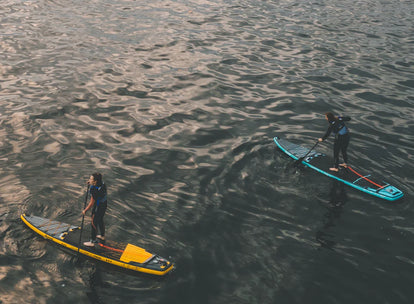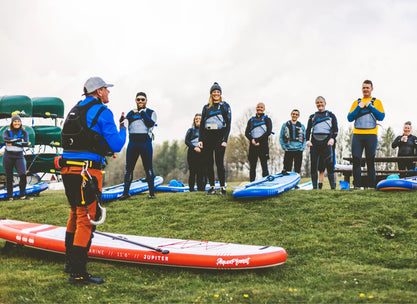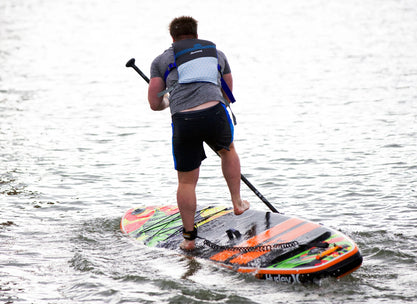Whether you're a paddle boarding newbie or already have a few sessions under your belt, staying upright on your board can sometimes feel like a balancing act. At Aquaplanet, we've got you covered with expert advice straight from our seasoned paddle board instructors. Let’s dive into ten top tips to help you stay on board and make the most of your time on the water!
1. Start on calm water

The first rule of thumb is to start on calm, flat water. A peaceful lake or a still bay is perfect for beginners because it reduces the challenge of maintaining balance. Without the added difficulty of waves or currents, you can focus on getting comfortable with your board and perfecting your stance. As you gain confidence, you can gradually move on to more challenging waters.
2. Choose the right board

Selecting the right paddleboard is crucial to staying upright. A wider board offers more stability, making it easier to balance. For beginners, we recommend starting with a board that's at least 32 inches wide. As your skills improve, you can transition to a narrower board, which will give you more speed and agility. Also, consider your weight and height when choosing a board—a board that's too small or too large for your body size can make balancing much more difficult.
Need help finding the perfect paddle board? Try our 30 second quiz and we will find the right SUP for you.
3. Mind your stance

Your stance on the board is foundational to your balance. Stand with your feet parallel and shoulder-width apart, placing them on either side of the carry handle. This position helps centre your weight over the board, giving you a stable base. Keep your knees slightly bent and your back straight, which allows your body to absorb any motion from the water and stay balanced. Engage your core muscles to further stabilise your body and keep you upright.
4. Look ahead

It’s natural to want to look down at your feet, especially when you’re just starting out. However, looking down can throw off your balance. Instead, keep your eyes on the horizon or a fixed point ahead of you. This will help you maintain your balance and stay on course. It also helps you anticipate any changes in the water, like approaching waves or obstacles, so you can adjust your balance accordingly.
5. Use your core, not just your arms

When paddling, many beginners make the mistake of relying solely on their arms, which can lead to quick fatigue and instability. Instead, focus on engaging your core and using your whole body to paddle. This technique not only propels you forward more efficiently but also helps stabilise your board. By rotating your torso with each paddle stroke, you distribute your weight more evenly and maintain better balance on the board.
6. Practice falling

It might sound counterintuitive, but practising how to fall can actually help you stay on your board in the long run. Knowing how to fall safely reduces the fear of falling and boosts your confidence. When you feel yourself losing balance, aim to fall away from the board to avoid hitting it. Remember to protect your head with your arms and try to land in the water feet first. The more comfortable you are with falling, the less likely you are to panic and lose your balance in the first place.
7. Check the wind and weather

Windy conditions can make staying upright on your paddleboard much more challenging, especially for beginners. Before you head out, always check the weather forecast. Light winds are usually manageable, but anything over 10-12 mph can create choppy water that’s tough to navigate. If you're new to paddleboarding, stick to calm, windless days until you build up your skill level. Also, be mindful of sudden weather changes and always have an exit plan.
8. Stay relaxed

Tension is the enemy of balance. When you’re stiff and tense, your body is less responsive to the subtle movements of the board. Try to stay relaxed, especially when you feel a wobble. Breathe deeply and keep your muscles loose—this allows your body to adjust quickly to shifts in balance. The more relaxed you are, the easier it is to regain control if you start to tip.
9. Keep paddling

It might seem counterintuitive, but if you start to feel unstable, the best thing you can do is keep paddling. The forward momentum generated by paddling helps stabilise your board and can prevent a fall. When you stop paddling, you lose this momentum, which can make it harder to stay upright. So if you feel a wobble, don’t freeze—keep moving!
10. Don’t overthink it

The more you overthink, the more likely you are to make mistakes. Paddleboarding is as much about feeling as it is about technique. Overthinking can lead to unnecessary tension, which affects your balance and makes you more likely to fall. Instead, focus on enjoying the experience. Trust your instincts, stay present in the moment, and with practice, staying on your board will become second nature.
Ready to get on board?
At Aquaplanet, we're passionate about helping you get the most out of your paddle boarding adventures. Whether you're just starting out or looking to refine your skills, these tips will help you stay upright and confident on your board. Happy paddling!


